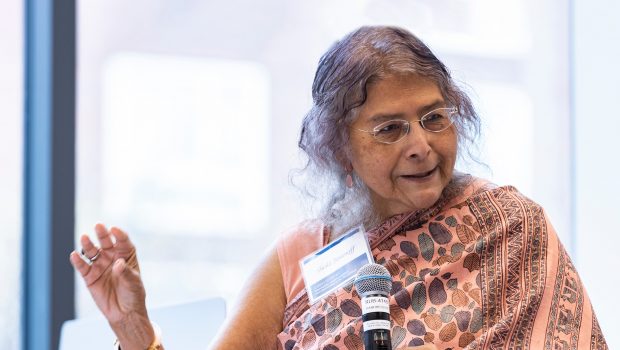Sheila Jasanoff, a pioneer of science and technology studies, looks back on how the field has matured and forward to how it might evolve
Science and technology are woven into the fabric of our lives—from the way we heal the sick to the way we communicate with each other to the way we wage war. With these advances, however, come questions about security, privacy, health, sustainability, and more. For this reason, how governments, societies, and individuals engage with science and technology has become a rich field of interdisciplinary study.
Sheila Jasanoff, the Pforzheimer Professor of Science and Technology Studies, is a pioneer in this field, having been a founding chair of the Science and Technology Studies Department at Cornell University before joining Harvard in 1998 and launching the Program on Science, Technology, and Society (STS) at Harvard Kennedy School.
Harvard’s STS program is celebrating its 20th anniversary this week with a three-day multidisciplinary symposium, “Science, Technology, and the Human Future,” featuring a keynote by novelist Arundhati Roy; panels on the role of science and technology in shaping the future of knowledge, life, public policy, and cities; and conversations about how the STS field can help us better understand ourselves, our societies, and our Earth. We spoke with Jasanoff, who earlier this year won the prestigious Holberg Prize for her work, about the development and future of the STS field.
Q: How has the STS field changed or developed in the last 20 years?
STS has moved from mainly studying how scientists work and what risks technology poses, to asking deeper questions about how to channel science and technology for the public good and to deploy the power of innovation responsibly. STS studies are now seen as essential because science and technology permeate our lives, and all of the grand challenges we face as 21st century human societies demand that we think harder about what we need to know and how we should use our knowledge. STS is therefore increasingly regarded as a field that universities must do more to build and nurture for the sake of making us better scientists, doctors, and engineers, but also smarter citizens and policy makers. STS is no longer a formless space between disciplines but a well-defined field that is necessary for our development as thoughtful, self-aware societies.








Gloss